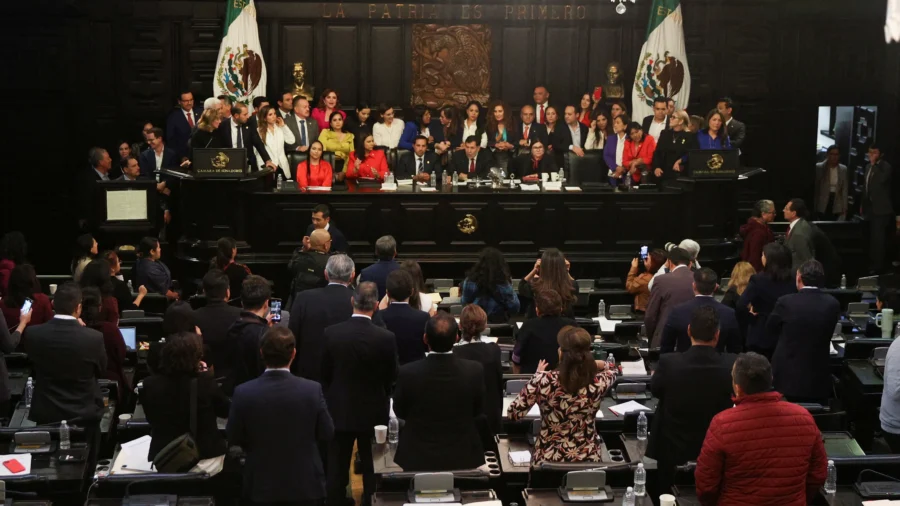Mexico’s Senate has approved a sweeping judicial reform measure despite opposition from critics, including the Supreme Court, who argue the changes could undermine the independence of the judiciary.
The Senate’s 86–41 vote on Sept. 11 secured the two-thirds majority needed to pass the constitutional reform, which allows judges to be elected by popular vote, including to the Supreme Court. It also reduces the number of Supreme Court judges from 11 to nine, caps term length at 12 years, halves necessary work experience to five years, and abolishes a minimum age requirement of 35.
The reform, which passed after intense debate and dramatic scenes, has sparked protests and concerns about its potential to disrupt the balance of power in Mexico’s legal system.
“It’s a sad day for our Mexico,” Sen. Alejandro Moreno, president of the centrist opposition PRI party, said. He said the reform was passed only thanks to “the worst tricks and under unimaginable pressures and coercions.”
The ruling leftist Morena party, however, celebrated the vote. President Andrés Manuel López Obrador, whose term ends in a matter of weeks, acknowledged opposition to the reform but praised its passage as a significant step toward a more just and transparent judiciary.
“It’s incredibly important to put an end to corruption and impunity,” he said during a press conference on Sept. 11. “We are going to move forward in Mexico, and we are going to set an example for the world.”
Mexico’s incoming president, Claudia Sheinbaum, also from the Morena party and a close ally of Obrador, praised the Senate’s approval of the reform measure.
“With the election of judges, magistrates and ministers, the administration of justice in our country will be strengthened. The regime of corruption and privileges is becoming a thing of the past and a true democracy and the rule of law are being built,” she wrote in a statement on social media platform X.
Obrador has said the reform would lower corruption by making it easier to discipline judges. Critics contend that the overhaul could have the opposite effect by stacking the courts with judges favoring the president’s party, undermining the judiciary by letting anyone with a law degree become a judge, and allowing corrupt individuals—even criminals—to have greater sway over Mexico’s legal system.
Ken Salazar, U.S. ambassador to Mexico and a former lawyer, has called the reform plan a “major risk” to democracy that also threatens Mexico’s trade relationship with the United States, which “relies on investors’ confidence in Mexico’s legal framework.”
“Direct elections would also make it easier for cartels and other bad actors to take advantage of politically motivated and inexperienced judges,” Salazar wrote in a statement issued in late August.
Norma Lucía Piña Hernández, president of Mexico’s Supreme Court, has also argued against the reform.
“The demolition of the judiciary is not the way to make the profound and necessary changes to build peace, justice and reparation that Mexico needs so much,” Piña said in a statement, in which she presented alternative ideas for judicial reform.
The Sept. 11 vote approving the reform measure came after hundreds of protesters forced their way into the Senate a day earlier while lawmakers were debating the controversial plans.
Some of the protesters, armed with pipes and chains, managed to force their way into the Senate chamber in an attempt to block a vote being taken.
The protesters, waving the Mexican flag, were joined by some opposition senators as they chanted, “The judiciary isn’t going to fall.”
Andrea Chávez, a Morena senator, wrote on social media, “Violently breaking into the plenary session where we, the representatives of the people, deliberate is not a way to resolve differences.”
Alejandro Navarrete, a 30-year-old judicial worker who protested outside the Senate, said people like him working in the courts were well aware of “the danger the reform represents.”
“They have decided to sell out the nation, and sell out for political capital they were offered, we felt obligated to enter the Senate,” Navarrete said.
“Our intention is not violent, we didn’t intend to hurt them, but we intend to make it clear that the Mexican people won’t allow them to lead us into a dictatorship.”
The new rules allow for the popular election of more than 6,500 judges, magistrates, and ministers. Elections to replace most of the judges will take place in 2025, with ballots cast for the remainder two years later.
Chris Summers, the Associated Press, and Reuters contributed to this report.
From The Epoch Times

